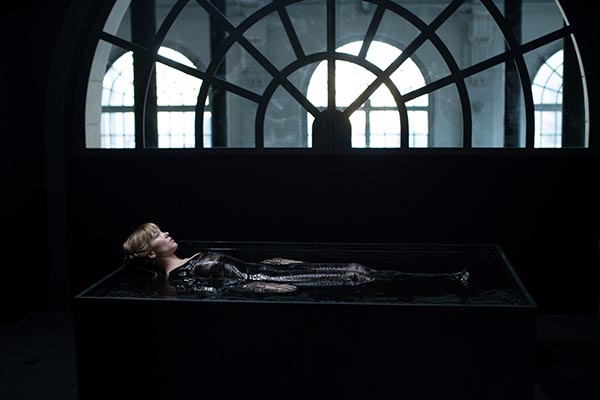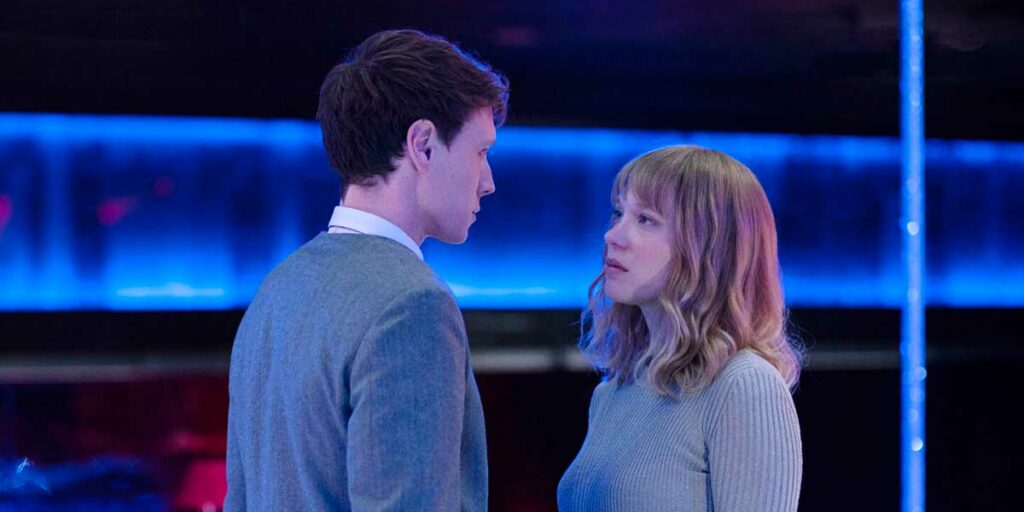Bertrand Bonello’s The Beast explores the fear of an unknown future in three eras, but the intellectual ambition is thwarted by a central dynamic that’s pretty distasteful.
It’s been said that AI will be the end of life as we know it. In Bertrand Bonello’s The Beast (La Bête), it is a plot device through which the director can explore the power of feeling, and a means in which technology may yet rid the world of emotion and what makes us uniquely ‘human’. Loosely adapted from Henry James’ 1903 novel ‘The Beast in the Jungle’, it borrows the idea that there’s something terrifying lurking in the future, a wild animal we cannot understand just waiting to ravage us. Bonello’s film uses a love story to interrogate this idea and this notion of fear, but ultimately churns out something that’s off-putting, convoluted and borderline boring.
In the near future, there’s a programme called ‘purification’ which lets you rid yourself of emotions. The theory being that it makes you more efficient and able to perform better at work without all those pesky human feelings getting in the way. Gabrielle (Léa Seydoux) signs up, and finds that part of the process involves reliving some past lives and working through repressed emotion. In each one, she finds herself drawn to Louis (George MacKay), and the film sets out to explore their connection in three different versions of their lives: Paris during the great flood of 1910, California after the earthquake in 2014, and then a desolate Paris in 2044.
Perhaps The Beast’s greatest flaw is that the central ‘love’ story doesn’t work in every setting, making the throughline a bit of a drag. In 1910, there’s constant talk about our central pair having met before, of Gabriella having shared a secret of feeling fearful that something bad is coming to ‘obliterate’ her. It gives them history and authenticity, an intimacy that can explain why they feel so drawn to each other. It’s almost like they are star-crossed lovers, with her marriage to another man being the taboo that exists between their obvious chemistry. In fact, the most sensual scene in the whole film involves them simply touching hands when they shouldn’t.
But skip forward to 2014, and they are completely different individuals with a dynamic that is almost the complete opposite. In this life, she’s a wannabe actress and he’s an incel with a video camera ripped straight from the pages of manifestos like Elliot Rodger’s, and their connection has absolutely zero tenderness or romantic nature. In fact, it’s mildly distasteful. It’s such a jarring change that it means the rest of the film stumbles, because it’s difficult to understand why the connection would transfer over into 2044 too. Soulmates only work when both parties are on the same page, and these two are certainly not.

The titular ‘beast’ feels at times like it could be a metaphor for love, for how scary and all consuming it can feel. Some might even say it feels like something that can obliterate you. But perhaps it’s more accurate to say that Bonello’s ‘beast’ is the future, the unknown, and the terrifying dive into technology we are taking. Bonello seems keen to explore fear, love and anxiety through this prism of technology, and how we’re losing that human connection with a reliance on automation.
It’s a terrifying idea, being stripped of emotion and humanity, and his Paris of 2044 feels desolate because it is lacking ‘life’ and depth as a side effect of the purification. In 2014, Gabrielle wants to be an actress, but her auditions take place on green screen, where she must simply react to something that technology will create, rather than act organically with something physical. The audition that acts as the opening sequence of the film repeats itself later on, this time in situ with Gabrielle acting to a genuine physical threat. The ‘beast’ she’d imagined becomes a reality for her, and it amplifies the film’s central motif of the future being something to worry about. But The Beast feels too convoluted for this to really blossom in the midst of the film, and so it just feels strange.
Seydoux gives a really committed performance, with Gabrielle being the only character to have any sort of engaging emotional journey. She runs the gamut here, with Bonello keeping Josée Deshaies’ camera almost fixed to her face at times. MacKay is also impressive, even if his character is, at its most basic, a symbol for which Gabrielle’s feelings, anxieties and emotions are able to develop.
There are interesting visuals, a cacophony of sound that sometimes works and sometimes feels overwhelming, and the end credits are an ironic stab at humour that might well the highlight of the entire film. The Beast is ambitious and intellectual sci-fi, but one that could polarise audiences. It’s a film that invites critical thought and may take some time to fully grasp, but doesn’t particularly endeavour itself by the end to those who lose touch with it as soon as it hits 2014. Bonello’s film explores the idea of technology and the fear we should have of its threat to us in the future, but the thought of watching The Beast again is terrifying enough.
The Beast (La Bête) premiered at the 2023 Venice Film Festival on September 3 and will be released in UK and Irish cinemas on May 31, 2024.

